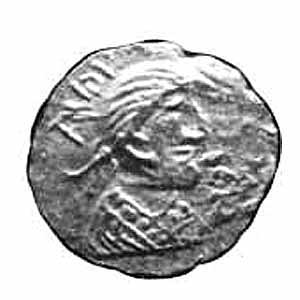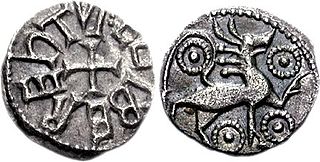Æthelberht was King of Kent from about 589 until his death. The eighth-century monk Bede, in his Ecclesiastical History of the English People, lists him as the third king to hold imperium over other Anglo-Saxon kingdoms. In the late ninth century Anglo-Saxon Chronicle, he is referred to as a bretwalda, or "Britain-ruler". He was the first English king to convert to Christianity.

Justus was the fourth Archbishop of Canterbury. He was sent from Italy to England by Pope Gregory the Great, on a mission to Christianize the Anglo-Saxons from their native paganism, probably arriving with the second group of missionaries despatched in 601. Justus became the first Bishop of Rochester in 604, and attended a church council in Paris in 614.

Offa was King of Mercia, a kingdom of Anglo-Saxon England, from 757 until his death. The son of Thingfrith and a descendant of Eowa, Offa came to the throne after a period of civil war following the assassination of Æthelbald. Offa defeated the other claimant, Beornred. In the early years of Offa's reign, it is likely that he consolidated his control of Midland peoples such as the Hwicce and the Magonsæte. Taking advantage of instability in the kingdom of Kent to establish himself as overlord, Offa also controlled Sussex by 771, though his authority did not remain unchallenged in either territory. In the 780s he extended Mercian Supremacy over most of southern England, allying with Beorhtric of Wessex, who married Offa's daughter Eadburh, and regained complete control of the southeast. He also became the overlord of East Anglia and had King Æthelberht II of East Anglia beheaded in 794, perhaps for rebelling against him.

Ecgberht, also spelled Egbert, Ecgbert, Ecgbriht, Ecgbeorht, and Ecbert, was King of Wessex from 802 until his death in 839. His father was King Ealhmund of Kent. In the 780s, Ecgberht was forced into exile to Charlemagne's court in the Frankish Empire by the kings Offa of Mercia and Beorhtric of Wessex, but on Beorhtric's death in 802, Ecgberht returned and took the throne.

Æthelbald was the King of Mercia, in what is now the English Midlands from 716 until he was killed in 757. Æthelbald was the son of Alweo and thus a grandson of King Eowa. Æthelbald came to the throne after the death of his cousin, King Ceolred, who had driven him into exile. During his long reign, Mercia became the dominant kingdom of the Anglo-Saxons, and recovered the position of pre-eminence it had enjoyed during the strong reigns of Mercian kings Penda and Wulfhere between about 628 and 675.

Æthelred was king of Mercia from 675 until 704. He was the son of Penda of Mercia and came to the throne in 675, when his brother, Wulfhere of Mercia, died from an illness. Within a year of his accession he invaded Kent, where his armies destroyed the city of Rochester. In 679 he defeated his brother-in-law, Ecgfrith of Northumbria, at the Battle of the Trent: the battle was a major setback for the Northumbrians, and effectively ended their military involvement in English affairs south of the Humber. It also permanently returned the kingdom of Lindsey to Mercia's possession. However, Æthelred was unable to re-establish his predecessors' domination of southern Britain.

Coenwulf was the King of Mercia from December 796 until his death in 821. He was a descendant of King Pybba, who ruled Mercia in the early 7th century. He succeeded Ecgfrith, the son of Offa; Ecgfrith only reigned for five months, and Coenwulf ascended the throne in the same year that Offa died. In the early years of Coenwulf's reign he had to deal with a revolt in Kent, which had been under Offa's control. Eadberht Præn returned from exile in Francia to claim the Kentish throne, and Coenwulf was forced to wait for papal support before he could intervene. When Pope Leo III agreed to anathematise Eadberht, Coenwulf invaded and retook the kingdom; Eadberht was taken prisoner, was blinded, and had his hands cut off. Coenwulf also appears to have lost control of the kingdom of East Anglia during the early part of his reign, as an independent coinage appears under King Eadwald. Coenwulf's coinage reappears in 805, indicating that the kingdom was again under Mercian control. Several campaigns of Coenwulf's against the Welsh are recorded, but only one conflict with Northumbria, in 801, though it is likely that Coenwulf continued to support the opponents of the Northumbrian king Eardwulf.

Eadbald was King of Kent from 616 until his death in 640. He was the son of King Æthelberht and his wife Bertha, a daughter of the Merovingian king Charibert. Æthelberht made Kent the dominant force in England during his reign and became the first Anglo-Saxon king to convert to Christianity from Anglo-Saxon paganism. Eadbald's accession was a significant setback for the growth of the church, since he retained his people's paganism and did not convert to Christianity for at least a year, and perhaps for as much as eight years. He was ultimately converted by either Laurentius or Justus, and separated from his first wife, who had been his stepmother, at the insistence of the church. Eadbald's second wife was Emma, who may have been a Frankish princess. They had two sons, Eormenred and Eorcenberht, and a daughter, Eanswith.
Wihtred was king of Kent from about 690 or 691 until his death. He was a son of Ecgberht I and a brother of Eadric. Wihtred ascended to the throne after a confused period in the 680s, which included a brief conquest of Kent by Cædwalla of Wessex, and subsequent dynastic conflicts. His immediate predecessor was Oswine, who was probably descended from Eadbald, though not through the same line as Wihtred. Shortly after the start of his reign, Wihtred issued a code of laws—the Law of Wihtred—that has been preserved in a manuscript known as the Textus Roffensis. The laws pay a great deal of attention to the rights of the Church, including punishment for irregular marriages and for pagan worship. Wihtred's long reign had few incidents recorded in the annals of the day. He was succeeded in 725 by his sons, Æthelberht II, Eadberht I, and Alric.
Æthelbert was an eighth-century scholar, teacher, and Archbishop of York. Related to his predecessor at York, he became a monk at an early age and was in charge of the cathedral's library and school before becoming archbishop. He taught a number of missionaries and scholars, including Alcuin, at the school. While archbishop Æthelbert rebuilt the cathedral and sent missionaries to the Continent. Æthelbert retired before his death, and during his retirement built another church in York.

Eadberht was king of Northumbria from 737 or 738 to 758. He was the brother of Ecgbert, Archbishop of York. His reign is seen as a return to the imperial ambitions of seventh-century Northumbria and may represent a period of economic prosperity. He faced internal opposition from rival dynasties and at least two actual or potential rivals were killed during his reign. In 758 he abdicated in favour of his son Oswulf and became a monk at York.
Saint Ceolwulf was King of Northumbria from 729 until 737, except for a short period in 731 or 732 when he was deposed and quickly restored to power. Ceolwulf abdicated and entered the monastery at Lindisfarne. He was the "most glorious king" to whom Bede dedicated his Historia ecclesiastica gentis Anglorum.
Oswulf was king of Northumbria from 758 to 759. He succeeded his father Eadberht, who had abdicated and joined the monastery at York. Oswulf's uncle was Ecgbert, Archbishop of York.

Æthelwald Moll was King of Northumbria, the historic petty kingdom of Angles in medieval England, from 759 to 765. He seized power after the murder of Oswulf son of Eadberht; his ancestry and connection to the royal family of Northumbria is unknown. Æthelwald faced at least one rebellion, led by Oswine, perhaps a brother of Oswulf. In 765 a Witenagemot of Northumbrian notables deposed Æthelwald and replaced him with Alhred, a kinsman of his predecessor. After his removal from the throne Æthelwald became a monk, perhaps involuntarily.

Æthelred, was the king of Northumbria from 774 to 779 and again from 790 until he was murdered in 796. He was the son of Æthelwald Moll and Æthelthryth and possibly became king while still a child after Alhred was deposed.

Ælfwald was king of Northumbria from 779 to 788. He is thought to have been a son of Oswulf, and thus a grandson of Eadberht Eating.
Eardwulf was king of Northumbria from 796 to 806, when he was deposed and went into exile. He may have had a second reign from 808 until perhaps 811 or 830. Northumbria in the last years of the eighth century was the scene of dynastic strife between several noble families: in 790, king Æthelred I attempted to have Eardwulf assassinated. Eardwulf's survival may have been viewed as a sign of divine favour. A group of nobles conspired to assassinate Æthelred in April 796 and he was succeeded by Osbald: Osbald's reign lasted only twenty-seven days before he was deposed and Eardwulf became king on 14 May 796.
Osred II was King of Northumbria from 789 to 790. He was the son of Alhred and Osgifu, daughter of Eadberht.
Æthelwold, also known as Æthelwald or Æþelwald, was a 7th-century king of East Anglia, the long-lived Anglo-Saxon kingdom which today includes the English counties of Norfolk and Suffolk. He was a member of the Wuffingas dynasty, which ruled East Anglia from their regio at Rendlesham. The two Anglo-Saxon cemeteries at Sutton Hoo, the monastery at Iken, the East Anglian see at Dommoc and the emerging port of Ipswich were all in the vicinity of Rendlesham.
Events from the 8th century in England.












